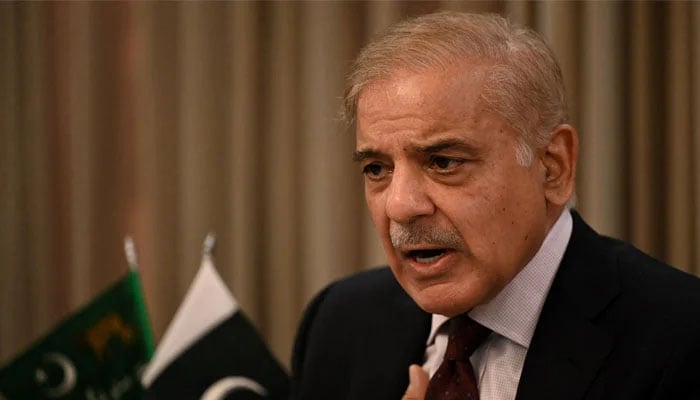21-member EAC formed for macroeconomic stabilisation
The government has constituted the EAC under the Chairmanship of Prime Minister Shehbaz Sharif
ISLAMABAD: The government has constituted the Economic Advisory Council (EAC) under the Chairmanship of Prime Minister Shehbaz Sharif comprising 21 members to seek advice on short-term macroeconomic stabilisation and structural reforms for achieving sustained growth. The EAC will comprise federal ministers, economists, former bureaucrats, businessmen and bankers.
According to the Terms of Reference (ToRs) for EAC, it is being established to review and formulate economic policies more holistically. The EAC will advise on short-term macro-economic stabilization as well as structural reforms for stable and sustained economic progress.
The EAC will be convened on weekly basis on the issues of national economic importance. The official notification issued for the establishment of the EAC states that the prime minister is pleased to constitute the Economic Advisory Council (EAC). The EAC shall be chaired by the Prime Minister. The composition of the Economic Advisory Council shall constitute Shahid Khaqan Abbasi, Ahsan Iqbal Chaudhary, Miftah Ismail, Saleem Mandviwalla, Marriyum Aurangzeb, Dr Ayesha Ghous Pasha, Mussadiq Malik, Tariq Pasha, Mian Muhammad Mansha, Mohammad Ali Tabba, Arif Habib, Dr Asim Hussain, Atif Bajwa, Faisal Farid, Aurangzeb, HBL, Waqar Ahmad Malik, MD/CEO Fauji Foundation, Salman Ahmed, Shahzad Salim, Rahman Naseem, Musadaq Zulqarnain and Dr Ijaz Nabi.
The scope of work and structure of the Economic Advisory Council is mandated to review the overall economic condition of the country and propose possible corrective measures considering available resources, analyze the effectiveness of subsidies, protection, and other financial support by the government to the state-owned enterprises (SoEs) and other vital sectors of the economy in the context of overall cost and benefit analysis of such subsidies/protection, review the existing market imperfections in the various important sectors of the economy to promote competition by correcting the market distortions, to advise the government ministries, organizations, bodies and various project implementing agencies in formulating evidence-based policies, to help in finding the technical expertise and human resource that may be required to carry out the requisite financial and economic analysis/studies.
The Economic Advisory Council will initially meet once a week (virtually/in person). The specific sub-committees will be formed for focused work with the timelines and defined scope. The EAC may co-opt any other member as per requirement.
Many independent analysts termed the constitution of such forums as routine and a public relations exercise keeping in view the past experiences where it did not contribute much to bringing any good input to policy formulations. In the past several committees were constituted but failed to achieve the desired results. Now it is hoped that this EAC will contribute to policy formulation for the best of the country instead of protecting the vested interests of specific individuals.
-
 Jonathan Majors Set To Make Explosive Comeback To Acting After 2023 Conviction
Jonathan Majors Set To Make Explosive Comeback To Acting After 2023 Conviction -
 Next James Bond: Why Jacob Elordi May Never Get 007 Role?
Next James Bond: Why Jacob Elordi May Never Get 007 Role? -
 Maddox Drops Pitt From Surname In Credits Of Angelina Jolie’s New Film 'Couture' Despite Truce From Father's End In Legal Battle
Maddox Drops Pitt From Surname In Credits Of Angelina Jolie’s New Film 'Couture' Despite Truce From Father's End In Legal Battle -
 Burger King Launches AI Chatbot To Track Employee Politeness
Burger King Launches AI Chatbot To Track Employee Politeness -
 Andrew’s Woes Amid King Charles’ Cancer Battle Triggers Harry Into Action For ‘stiff Upper Lip’ Type Dad
Andrew’s Woes Amid King Charles’ Cancer Battle Triggers Harry Into Action For ‘stiff Upper Lip’ Type Dad -
 Experts Warn Andrew’s Legal Troubles In UK Could Be Far From Over
Experts Warn Andrew’s Legal Troubles In UK Could Be Far From Over -
 Teyana Taylor Reflects On Dreams Turning Into Reality Amid Major Score
Teyana Taylor Reflects On Dreams Turning Into Reality Amid Major Score -
 Jennifer Garner Drops Parenting Truth Bomb On Teens With Kylie Kelce: 'They're Amazing'
Jennifer Garner Drops Parenting Truth Bomb On Teens With Kylie Kelce: 'They're Amazing' -
 AI Is Creating More Security Problems Than It Solves, Report Warns
AI Is Creating More Security Problems Than It Solves, Report Warns -
 'Game Of Thrones' Prequel 'A Knight Of The Seven Kingdoms' New Ratings Mark Huge Milestone
'Game Of Thrones' Prequel 'A Knight Of The Seven Kingdoms' New Ratings Mark Huge Milestone -
 Apple Seeks To Dismiss Fraud Suit Over Siri AI, Epic Injunction
Apple Seeks To Dismiss Fraud Suit Over Siri AI, Epic Injunction -
 Delroy Lindo Explains The Crucial Role Of Musical Arts In Setting Up His Career Trajectory
Delroy Lindo Explains The Crucial Role Of Musical Arts In Setting Up His Career Trajectory -
 Timothée Chalamet Reveals How He Manages To Choose The Best Roles For Himself
Timothée Chalamet Reveals How He Manages To Choose The Best Roles For Himself -
 Princesses Beatrice, Eugenie’s Conflict Gets Exposed As Mom Fergie Takes Over The Media
Princesses Beatrice, Eugenie’s Conflict Gets Exposed As Mom Fergie Takes Over The Media -
 Kate Middleton Plays Rock-paper-scissors In The Rain
Kate Middleton Plays Rock-paper-scissors In The Rain -
 Lindsay Lohan On 'confusing' Teen Fame After 'Mean Girls': 'I Should Have Listened To My Mom And Dad'
Lindsay Lohan On 'confusing' Teen Fame After 'Mean Girls': 'I Should Have Listened To My Mom And Dad'




